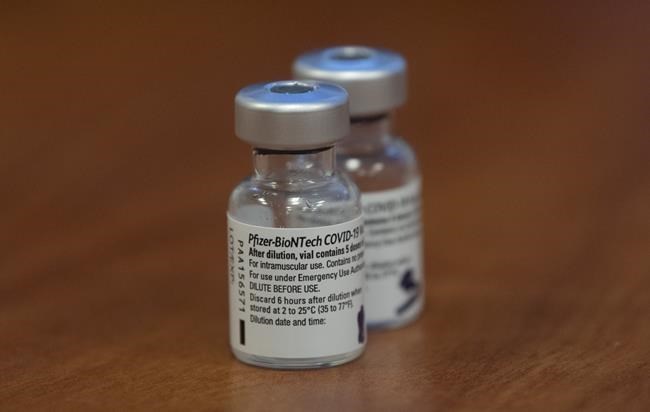OTTAWA — Canada's struggling COVID-19 vaccination efforts saw multiple positive signs Friday, with further evidence one dose of a leading vaccine could be almost as good as two, news that Pfizer's vaccine might not need to be kept extraordinarily cold, and a major milestone toward herd immunity passed.
On Friday morning, the millionth Canadian received a first dose of either the Pfizer-BioNTech or Moderna vaccine. The marker came weeks later than expected after nearly a month of shrunken shipments from both Pfizer and Moderna.
Despite the slower than expected start, Canada's chief public health officer Dr. Theresa Tam said "we can be very optimistic" about the performance of the vaccines so far.
While both Pfizer-BioNTech and Moderna say their vaccines need two doses for full effectiveness, given three or four weeks apart, evidence is mounting that the first dose might be almost as good by itself.
Quebec reported Thursday the vaccines given there had been 80 per cent effective at preventing COVID-19 two weeks after a single dose for health care workers, and three weeks after a single dose for elderly long-term care residents.
British Columbia reported similar results Friday.¬Ý
And a study in the medical journal The Lancet published Thursday showed after two to four weeks, a single dose was 85 per cent effective at preventing symptomatic COVID-19 infections in more than 7,000 health care workers vaccinated in Israel in December and January.
"It is incredible, I think, that we have such an efficacious tool," Tam said.
Health Canada and provincial public health officials are examining the data actively right now as a discussion continues about whether single doses should be offered to more people, and second doses delayed until most highly vulnerable people have received their first.
Pfizer and BioNTech also now say their vaccine can be stored for up to two weeks at temperatures in a standard freezer — between -15C and -25C — potentially making it easier to use the vaccine in more remote locations.
That vaccine currently is to be stored at ultralow temperatures between -60C and -80C, and then can be thawed in a fridge for five days before being mixed with saline to inject.
The requirement has limited the places Pfizer's vaccine is used in Canada. The northern territories and northern First Nations have been limited to Moderna's product, which is shipped and stored in regular freezers already.
Pfizer and BioNTech applied to the U.S. Food and Drug Administration Friday to change that requirement to allow up to two weeks of regular freezer storage before thawing in the fridge, after testing showed that did not degrade the vaccine.¬Ý
Pfizer Canada spokeswoman Christina Antoniou said the same application will be made in Canada soon.
Canada's vaccine deliveries exploded this week, with 403,650 doses arriving from Pfizer. Canada expects to get more than four million more doses from Pfizer and Moderna over the next six weeks.
That news has allowed several provinces to expand their vaccination offerings beyond the first priority groups in long-term care homes and front-line health workers. At least three provinces — Nova Scotia, Ontario and Alberta — announced details for getting vaccines to seniors living in the community.
Nova Scotia's chief medical officer of health Dr. Robert Strang said next week the first of 10 community-based clinics will open to get vaccines to people over the age of 80.¬Ý
Retired general Rick Hillier, heading up Ontario's vaccination efforts, said Canada's most populous province will be able to start vaccinating people over the age of 80 by the middle of March.
And Alberta Premier Jason Kenney said next week people in his province who are at least 75 years old will be able to start making vaccine appointments. Kenney said second doses of vaccines have been offered to every eligible resident of the province's long-term care homes.
This report by The Canadian Press was first published Feb. 19, 2021.
Mia Rabson, The Canadian Press




